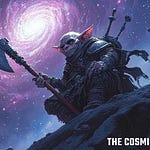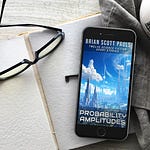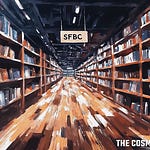This is the third story I’ve converted into a multimedia format. For now, it will be the last. One reason is creating the images and tweaking the AI narration takes a lot of time. The main reason is it’s only workable for me to do this with very short flash fiction pieces. Now that I’m writing at greater lengths, I’m not producing pieces appropriate for this format.
Not that these pieces are going away. I’m sending each of them through my alpha reader, beta reader, and editing processes. All will appear in Probability Amplitudes. I'm looking forward to seeing how much they improve with constructive criticism.
This story is the most personal I’ve written to-date. My wife and I adopted our eldest daughter from China. She lives with low-vision because of congenital cataracts. Since her birth was unauthorized under the one-child policy, she didn’t qualify for surgery as a toddler. The characters and technology in this story are fictional. Many of the details are biographical.
See below for both the multimedia version and the full text:
The Play of Light In the Present Moment
by Brian Scott Pauls
Perla gazed out at a sky washed in orange, yellow, blue, and the soft white of clouds she couldn't quite distinguish. She breathed in the dusty smell of old hay, and felt the alfalfa stems poking at her through her jeans where she sat on the large round bale, watching the sunset. Most summer evenings, an unobstructed view to the west let her end the day in the soft glow of a wondrous, impressionistic panorama. "God's canvas," Mom called it.
Perla heard a branch crack. She turned and saw Mom stepping out of the hedgerow. The tall woman smiled at her and came to stand next to the bale, her head just at the level of Perla's legs.
"Dad wanted me to make sure you knew to come in before it gets too late. We're leaving pretty early in the morning."
"I know," the girl said. "I just wanted to come out here and...think about it.”
Mom reached up and touched the back of Perla's hand where it lay on the bale.
"Mija," as always it came out more like "Mia." Mom's Spanish was horrible. "What's wrong?"
"I'm just not sure it's the right thing," Perla admitted. "The procedure."
"Oh mija. Better scoot over. I'm coming up."
The brain develops through a series of "critical periods," during which certain structures experience a high level of neural plasticity—the ability of brain cells to adapt in response to external stimuli. For the visual cortex, this period is roughly birth to three years.
Born with congenital cataracts, in a migrant camp with limited medical facilities, Perla missed the window. While her brain was learning to see, the cataracts just got worse. Her neurons simply didn't have enough visual information to develop what would be considered normal vision.
Getting around the camp wasn't a problem—if she ever went anywhere unfamiliar, Mamá or Papá was always with her. When she was about five, however, an epidemic took them both in the same month. After that it was harder, even though other residents agreed to care for her.
When she was nine, Mom and Dad—they were just Jayla and Elijah then—came to visit. She didn't know them and they didn't speak Spanish, but they were kind and brought presents, so when the camp director asked her about adopción, she agreed. After she got to her new home, Perla finally had her cataracts removed, seven or eight years too late. It helped some, but not a lot.
Now there was an experimental procedure. Research showed that a protein known as "cell adhesion molecule 1" appeared to inhibit neural plasticity. A process to remove the protein from the brain restored plasticity in mice. There had been trials, peer review, a ruling by the FDA.
Mom clambered to the top of the bale and let her boots dangle over the side. She took Perla's hand. "If you don't want to go tomorrow, we'll call the hospital and cancel."
"But, Dad already took out the loan..."
"That's nothing that can't be undone. We haven't even used any of it. We need to run it through insurance first."
"I don't know, Mom. I'm...scared."
"Of the procedure?"
"No one knows what the long-term effects will be. Is it worth it, just to see a little better?"
"It's a big decision."
"What if it doesn't work? What if you and Dad can't pay back the loan and we lose the farm?"
A pause. "Anything else?"
Perla was silent for a long time, then said quietly "The way I see is part of who I am. If I do this, am I saying I'm not good enough? If I can see just like everyone else, will I still be me?
Mom stared quietly out at the horizon. Finally, she replied. "Have I ever told you what Dad said before we decided to go get you?"
Perla shook her head.
"Dad never wavered, but I had doubts."
Perla caught her breath, waiting for her mother to continue.
"I had helped so many other families to adopt, I had seen so much as a social worker, there was no potential complication in the process that scared me."
"Then...why?"
"Because of your vision."
"What?"
"Because it was something I couldn't fix, couldn't control."
"What did Dad say?"
"He asked me about every difficulty he had ever heard me talk about on the phone with a client. He asked me if any of that bothered me. I said of course not. He replied, 'Well, I don't think we have a problem.'"
"He wasn't concerned about my vision?"
"No. He took me by the shoulders, looked me in the eyes, and said 'The one thing we don't have to worry about is teaching this kid how to not see. She's been doing that her whole life. She's got that. And you’ve got everything else.' Then he put his arms around me, pulled me close, and whispered in my ear 'Now, let's go get our daughter.'"
Perla felt a sting in her eyes and wiped them with the back of her wrist.
"Mija, we can't tell you what to do. You have to decide if it's worth the risk. But whatever you choose, we're behind you. I just want you to remember a couple of things. First, you will always be you, 20/20 vision or not. No matter what happens, you've got that."
"And the other thing?," Perla asked.
"We've got everything else. Insurance. The loan. The farm. That's why we're the parents. Let us do our job.”
Mom leaned over and hugged the sixteen-year-old, then swung her feet around and dropped to the ground.
"Don't stay out here too long. Dad will worry." Perla heard her walking back toward the hedgerow.
"Mom..."
"Yes, mija?" The footsteps paused.
"I'll probably go ahead and do it. I'm not certain...but probably. I'd like to see a sunset the way you and Dad do."
A pause. "OK." The footsteps resumed and soon faded.
Perla sat for a long time, staring into the darkness, listening to the chirping of the crickets.
The phrase "The play of light in the present moment" comes from Southern New Hampshire University: HUM 100 Worksheet: Realism, Impressionism, and the Modern World.
I hope you’ve enjoyed this sample of my fiction. I would love your feedback. Please comment below!
Probability Amplitudes will include “The Play of Light In the Present Moment” and other stories.
You may read, listen to, and view my other multimedia science fiction stories right here on The Cosmic Codex:















Share this post